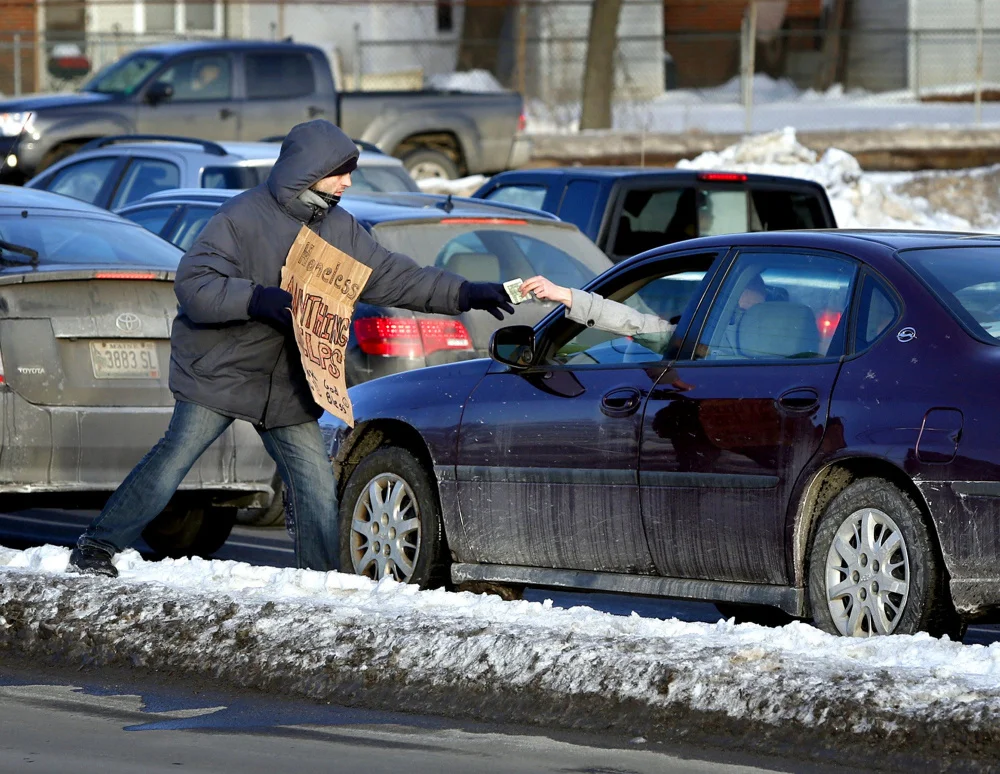The problem is, begging is more lucrative than, you know, working
/PORTLAND BEGGAR "NO, I Won't work for food, but thank you for ASKING"
WSJ: After linking work to food stamps, Maine seeks same with Medicaid
Maine wants to do to Medicaid what it did to food stamps: link the health program for low-income people to work requirements in the hope of reducing enrollment, raising incomes and prioritizing resources for children, the elderly and disabled.
The state is among several that plan to seek federal approval to apply work rules to able-bodied adults without dependents in its Medicaid program, which serves 270,000 people. To make the case, Maine officials say they will point to their record with food stamps.
In late 2014, Maine, under Republican Gov. Paul LePage, began requiring that able-bodied adults without dependents must work, undergo training or volunteer in order to receive the food assistance. Many people in that category didn’t meet the mandate—and enrollment for that group plunged 90% to 1,279 by this past January, according to the state.
Meanwhile, the policy led to higher wages for the group, including those who left the food stamp program, the state concluded, based on state wage and employment records in the year after the work requirements began.
“It absolutely demonstrated the value of prioritizing employment,” Maine Health and Human Services Commissioner Mary Mayhew said in an interview.
Maine is one of a number of states where Republican leaders—despite sputtering attempts in Washington to overhaul health care—are moving ahead to tighten eligibility for Medicaid, which is funded by the federal and state governments, as the Trump administration signals it is open to changes.
Work requirements linked to food stamps, a federal program administered by the states that is known formally as the Supplemental Nutrition Assistance Program, or SNAP, are more common.
Under federal rules, able-bodied adults between ages 18 and 49 without dependents are limited to three months of food stamps in any three-year period—unless they work at least 80 hours a month or meet certain education, training or volunteer criteria. The estimated 4.6 million recipients get about $168 a month on average in food-stamp benefits, according to the U.S. Agriculture Department.
In Kansas, the enrollment of nondisabled adults without dependents has fallen 70% from fall of 2013, when the state reinstituted work requirements, Kansas Department for Children and Families Secretary Phyllis Gilmore said in written testimony to Congress last month. Meanwhile, the number of those working nearly tripled after the labor mandate kicked in, she said.
“Kansas is sending the message that we prioritize employment, rather than paying individuals not to work,” she said.
Ms. Mayhew, Maine’s Health and Human Services commissioner, said linking work to assistance helps beneficiaries and Maine companies seeking to fill vacancies— amid statewide unemployment of 3.2%.
“There are thousands of jobs in Maine, many that do not require a high level of skill but employers are struggling mightily to recruit employees,” she said. “All these efforts are also about supporting a workforce that is really working.”
Portland Maine, which lost a court battle trying to force panhandlers from its street corners, has implemented a pilot program that sends welfare workers in a van around to those intersections, offering jobs at $10.68 an hour. They're met with the usual excuses that prevent the offerees from working: "health problems", "scheduling difficulties", and just plain indolence, but the reality is that drunks and addicts lack both the ability and the desire to show up for an eight-hour shift, sober or (usually) not, at anything, and the bleeding hearts of Portland, a city that last November went Hillary by a huge margin, enable them.
At another nearby intersection, Bryan Tardiff voiced support for the city program, but also warned that some panhandlers make more per hour than the city would pay. The 22-year-old said he can make $80 to $100 in as little as two hours flying a sign, enough to outweigh the shame and abuse that come with panhandling, including people yelling at him and throwing full cups of soda at him.
“I make more money flying a sign than I do at a full-time job,” he said.


